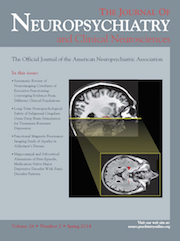Metacognition Training for Schizophrenia: A French Pilot Study
To the Editor: There is a need for psychological treatments for schizophrenia to enhance psychotropic effects. Resolving persistent symptoms and improving cognitive impairments and functional outcomes should be considered together. Metacognitive training (MCT) is a novel approach targeting cognitive biases that are assumed to play a role in the maintenance of psychotic symptoms.1 MCT has demonstrated its effectiveness in improving insight and in reducing psychopathology. This first pilot study conducted in France aimed to assess MCT impacts on social skills and mood in French in- and outpatients with schizophrenia.
Participants with a schizophrenia spectrum disorder were recruited from the University Medical Center in Besançon and were on stable neuroleptic medication. Exclusion criteria were age <18 years and aggressive behavior. After their informed consent to participate, they were tested before the MCT intervention (M0) and 8 weeks later (M2). The main parameters were the Independent Living Skills Survey (ILSS) and the Calgary Depression Scale for Schizophrenia (CDSS). We chose to use five (attribution, jumping to conclusions 1 and 2, changing beliefs, and self-esteem and mood) of the eight available MCT modules for their putative impact in line with our hypothesis.2 The intervention lasted 8 weeks with a total of 10 sessions of 1 hour each, presented by two trained therapists.
Ten patients were assessed for eligibility, and three refused to participate. Four women and three men (mean age 29.0) were analyzed in post-intervention, a few days after the last session (M2). As shown in Figure 1, ILSS global score improved after MCT, especially the “relationships” item, although it was not significant (t=−2.15, p=0.075). Some items of the CDSS declined significantly after MCT, as shown Figure 2. These items were “hopelessness” (z=1.97, p=0.049), “guilty reference thoughts” (z=1.98, p=0.048), “morning depressivity” (z=1.96, p=0.050), and suicide thoughts” (z=1.98, p=0.048).


This first pilot study on MCT intervention in a French population showed, in a pre- and post-design, an improvement trend in social interpersonal relationships and a significant reduction in depression. A low positive association between insight and depression has been described in a meta-analysis3 and in more recent studies.4 It is possible that emergence of low self-esteem and depression during MCT could be counteracted by the specific MCT module on this issue. In addition, if cognitive improvements lead to psychosocial positive changes, this seems to be a crucial question regarding cognitive approaches. In the same way, it would be interesting to assess whether MCT effects on psychotic symptoms could be related to improvements in global quality of life.5 These first results should be interpreted with caution because our exploratory study did not have a control group.
This pilot study allows us to prepare a randomized controlled study of MCT group versus an active control. In this study, global symptomatology and more specifically, positive and depressive symptoms, will be measured, as well as insight and quality of life. The effects of the intervention at the 6-month follow-up will also be measured.
1 : Antipsychotic treatment beyond antipsychotics: metacognitive intervention for schizophrenia patients improves delusional symptoms. Psychol Med 2011; 41:1823–1832Crossref, Medline, Google Scholar
2 : Metacognitive training in schizophrenia: from basic research to knowledge translation and intervention. Curr Opin Psychiatry 2007; 20:619–625Crossref, Medline, Google Scholar
3 : Insight in schizophrenia: a meta-analysis. Schizophr Res 2003; 61:75–88Crossref, Medline, Google Scholar
4 : Early insight predicts depression and attempted suicide after 4 years in first-episode schizophrenia and schizophreniform disorder. Acta Psychiatr Scand 2005; 112:449–455Crossref, Medline, Google Scholar
5 : The dilemma of insight into illness in schizophrenia: self- and expert-rated insight and quality of life. Eur Arch Psychiatry Clin Neurosci 2008; 258:152–159Crossref, Medline, Google Scholar



